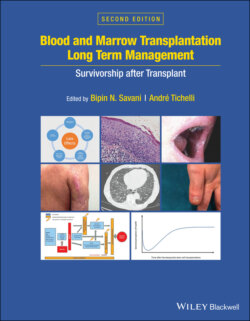Читать книгу Blood and Marrow Transplantation Long Term Management - Группа авторов - Страница 115
Cognitive Dysfunction
ОглавлениеNeurocognitive deficit is a well‐recognized late effect in HSCT recipients [7]. Cognitive dysfunction can be measured by subjective patient‐reported instruments (e.g. FACT‐Cog or PROMIS‐Cognitive Function) or objective neuro psychological testing, with the optimal tool depending on the clinical or research question [62]. In patients with breast cancer, receipt of high‐dose chemotherapy followed by autologous hematopoietic progenitor cell infusion was associated with a higher incidence of late cognitive impairment compared to standard dose chemotherapy (32% vs 17%) on neuro psychological testing [63]. Regarding self‐reported cognitive problems, auto‐transplant recipients scored significantly worse on the domains of concentration, memory, and thinking, compared to those who had received standard chemotherapy [63]. Another study on 388 transplant survivors with hematologic malignancies or breast cancer, approximately 80% of whom had received an auto‐transplant, showed significant improvement in objectively measured cognitive abilities at 1 year after transplant [64]. Performance in individual cognitive domains, as well as total neuro psychological performance score, was equal or superior to the population mean at 1 year [64]. Definitive data on comparative effect of auto‐transplant with high‐dose melphalan conditioning on patient‐reported cognitive impairment has been reported in the Myeloma X trial [60]. It was a large RCT comparing salvage second auto‐transplant to non‐transplant consolidation with oral cyclophosphamide in patients with relapsed MM. In auto‐transplant recipients, a clinically significant decrement in cognitive functioning was noted at day 100 compared to the non‐transplant arm. However, at 6‐month, 1‐year, and 2‐year marks, cognitive functioning gradually improved in the transplant arm, with the magnitude of improvement over non‐transplant arm increasing at each time‐point [60]. Cognitive rehabilitation programs and pharmacotherapy, including modafinil or methylphenidate, are currently used for chemotherapy‐induced cognitive impairment [65], and can be considered with auto‐transplant survivors. Geriatric assessments should be considered to identify patients with subclinical cognitive dysfunction. With a lack of prospective data and guidelines on geriatric assessment in this population, however, further studies are needed to identify patients who would benefit and optimal time‐points of geriatric assessments.
